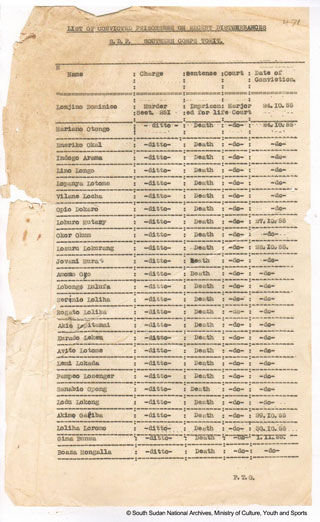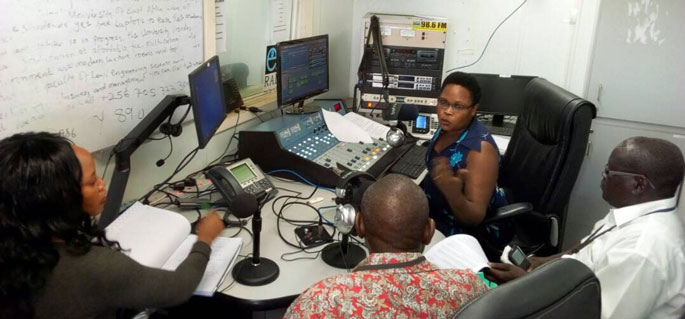Eye Radio and the Rift Valley Institute (RVI) aired the first of a five-part radio series about the South Sudan National Archives (SSNA) on Wednesday 1 November 2017, in coordination with the South Sudan Ministry of Culture, Youth and Sports and UNESCO, with Norway’s financial support.
The show’s host, Rosemary Ochinyi, and three South Sudanese panellists discussed a particularly important historical document, The Sentencing of the Torit Mutineers, which has been preserved and catalogued through the work of the Archives.

In 1955, members of the British-administered Sudan Defence Force Equatorial Corps mutinied in Torit. The document lists the names of 27 soldiers charged with murder and sentenced to death in the wake of what became known as the Torit Mutiny. Some of the mutineers that escaped eventually became part of an armed resistance movement, what became known as the Anya Nya, which fought against the government in Khartoum in the First Sudanese Civil War.
The panellists, Professor Samson Wassara (Vice-Chancellor of Bahr-el-Ghazal University), Ms Kuyang Logo (consultant in rule of law and part-time lecturer at the University of Juba), and Rev. Dr Bernard Suwa (consultant in peacebuilding and conflict transformation), used the documents to discuss the root causes of the mutiny and its historical significance, since it is often considered the starting point of South Sudan’s liberation struggle.
Professor Samson Wassara emphasized that ‘history is part of the identity of our people’ and that ‘the search for identity’ was at the centre of the events on 18 August 1955, which became known as the Torit Mutiny.
Bernard Suwa explained that the Torit Mutiny happened as the Anglo-Egyptian Condominium transitioned towards an independent Sudan. This involved the so-called Sudanisation process, which saw the ‘Southerners [of Sudan] discontented [and] dissatisfied, because the British were leaving without necessarily creating a conducive environment for them [as participants in Sudan’s independence]’.
Professor Wassara added that Southerners in ‘both the army and the civilians felt that they were being undermined and sold out by the British […] There were riots in Nzara in which the first blood was shed and information spread throughout the country […] From the political perspective the central government [in Khartoum] left no space for negotiations, all the channels were closed, and therefore action was taken by the Southern Corps in Torit [predominantly made up of people from the south] and especially the 2nd company’. The insurrection was repressed, the soldiers either escaped, surrendered or were captured by the government in Khartoum.
Host Rosemary Ochinyi asked Kuyang Logo to reflect on the fate of the mutineers: ‘They were tried by special courts’ which meant they had little legal representation in their defence, which ‘the government [could] justify […] as long as they are being tried under domestic laws’. Professor Wassara, added that the 27 named muntineers in the file were, ‘only the tip of the iceberg’ […]. The government summarily executed, ‘more than 200 members of the organized forces’, including soldiers and senior officers who had been persuaded to surrender. Dr Suwa remarked on the ‘heavy handedness’ of the government, which exacerbated ‘the deep mistrust and suspicion between Southerners and the central government’.
The Torit incident was followed by similar outbreaks of violence in Juba, Yei, Yambio, Wau and Malakal. Ms Kuyang commented, ‘Khartoum killed the Torit mutineers, yes, but their demands never died’ […] From 1955, the same demands were carried on. And when you see the secessionist agenda of the Anya Nya, of the SPLM, it is basically a journey which started with the Torit mutineers’. Some of those soldiers who managed to escape went on to help form the Sudan African National Union (SANU) in exile in Kinshasa, and some helped form the Anya Nya army around 1962.
Professor Wassara stated that ‘the Torit Mutiny should be celebrated [and that those who rebelled] had little education but […] they had a great understanding of the situation and a creative vision for the future. [It was] the first sign of consciousness that came to the surface’. From then onwards, the struggle for independence ‘grew like a child [and] had they not been there, there would be no Anya Nya […] and had Anya Nya not been there, there wouldn’t be SPLM [..] So we have to recognize this continuity […] It brought us SPLM which brought us the independence now’.
Dr Suwa called the Torit Mutiny a ‘departure point [which showed that] using military and political tools to suppress the citizens is not a right way to go. There has to be reaching out to people’. Professor Wassara agreed, ‘that’s a lesson we need to learn that whatever the situation, we need to open an avenue for negotiation, for tolerance and also later on for stability’.
Ms Logo concluded that it was important for South Sudanese to ‘reclaim their history’, and that ‘maybe one day, we won’t call them mutineers, but heroes’. Professor Wassara explicitly rejected the term ‘mutiny’ as a word applied by the Khartoum government as a way of belittling it, ‘For us, it is a revolution’.
The show also featured an interview with Youssef Onyalla, the Director for Archives at the Ministry of Culture, Youth and Sports, who spoke about his team’s important, yet frequently unrecognized, work on the South Sudan National Archives at their current location in Munuki, a Juba suburb. The Director described how the National Archives were established after the 2005 Comprehensive Peace Agreement with the support of a variety of external partners, and how the work of document collection, preservation and cataloguing began in 2007. He highlighted how the Archives hold nationally important documents such as the 1953 agreement between Egypt and Britain on the independence of Sudan, as well as a wealth of other records that represent reserve of knowledge on South Sudan’s history available to national and international researchers.
This discussion took place as part of the ‘Tarikh Tana (Our History)’ radio shows, which are taking place throughout the month of November 2017, alongside the South Sudan National Archives exhibition, to showcase the rich variety of documents in the Archives. Each show will focus on one document from the National Archives, selected together with RVI, UNESCO and the Ministry of Culture, Youth and Sports. For each chosen document, RVI brings together a panel of South Sudanese discussants to highlight the historical context surrounding the document, details of the document itself, its significance and related issues arising today. The next radio show will focus on the archive document called Gospel of St Mark in Bari (1952, Central Equatoria) and will take place on Wednesday 8 November 2017, at 16:00 EAT on Eye Radio (98.6FM).
To know more about the Torit Mutiny, please see:
- Lt. Gen. Joseph Lagu (Retd): Sudan, Odyssey Through A State. From Ruin to Hope (M.O.B. Center for Sudanese Studies, Omdurman Ahlia University, 2006)
- Douglas H. Johnson: The Root Causes of Sudan’s Civil Wars (Oxford, 2003)
- Øystein H. Rolandsen: A False Start : Between War and Peace in the Southen Sudan, 1956-1962, Journal of African History 52, pp. 105–123, 2011.
- Øystein H. Rolandsen and Cherry Leonardi: Discourses of violence in the transition from colonialism to independence in southern Sudan, 1955-1960.’, Journal of Eastern African studies, 8 (4). pp. 609-625, 2014.
- Scoppas S. Poggo: The First Sudanese Civil War. Africans, Arabs and Israelis in the Southern Sudan (1955-1972), Plagrave Macmillan, 2009
الجزء 1 : الحكم على قادة تمرد توريت (وثيقة من سنة 1955 ادارية الاستوائية)
اذاعة آي راديو ومعهد الاخدود اذاعت الجزئ الاول من مجموعة خمسة حلقات عن وثائق جنوب السودان في يوم
مشروع دار الوثائق الوطني
تلريخ تانا (تاريخنا)
حلقات اذاعية عن دار الوثائق الوطنية لجنوب السودان
الاربعاء 1 نوفمبر 2017 بالتنسيق مع وزارة الثقافة والشباب والرياضة واليونيسكو بدعم من الحكومة النرويجية.
واستضافت الحلقة روزماري اوشينجي وثلاثة أخرين من جنوب السودان في طاولة النقاش وتم مناقشة اهمية الوثائق التاريخية ، كمستند مرسوم الحكم على متمردي توريت والتي تم حفظه وتصنيفه من خلال عمل دار وثائق جنوب السودان, والمستند يشمل قائمة ل 27 عسكريا ادينوا يجرائم القتل وحكم عليهم بالاعدام في صحوة ما يعرف بتمرد توريت في عام 1955.

المحاورين البروفسير سامسون وزارا رئيس جامعة بحر الغزال والسيدة كوانق لوقو مستشارة سيادة القانون واستاذة متعاونة في جامعة جوبا والقس برنارد سوا مستشار بناء السلام وفض النزاعات، واستنادا على المستند تم نقاش المسببات الرئيسية للتمرد واهميتها التاريخية وتعتبر نقطة الانطلاقة لحركات تحرير جنوب السودان.
والبروفيسر سامسون وازارا اكد على “التاريخ هو جزء من هوية شعبنا وهو البحث عن الهوية” وكان ذلك في احداث 18 أغسطس 1955 والذي عرف بتمرد توريت.
القس برنارد سوا شرح بان تمرد توريت حدث اثناء الحكم الانجليزي المصري قبل استقلال السودان وهذا يتضمن ما يسمى باجراءات السودنة وكان ( جنوب ) السودان مثتثنى او غير مقنع لان الانجليز غادروا بدون خلق الارضية المناسبة لهم (كمشاركين في استقلال السودان).
البروفيسير وازارا اضاف ان الجنوبيين في كل من الجيش والمواطنين شعروا بانهم تجاهلوا وتم بيعهم من قيل الانجليز … كانت هناك تظاهرات في انزارا خيث زرف اول دم وعم الخبر كل ربوع البلاد … من المنظور السياسي الحكومة المركزية في الخرطوم لم تدع فرصة للحوار كل القنوات قد تم سدها لذلك تمت الحركة من خلال الجثث في توريت وكانت من قبل اناس من جنوب السودان خاصة القرقة الثانية. وانتشر خبر الانشقاق وقام العساكر بالهرب او الاستسلام او تم قبضهم من قبل حكومة الخرطوم.
المضيفة روز ميري سألت السيدة كويانق لوقو لتعكس رايها عن مصير المتمردين، “لقد تمت محامتهم بمحاكم خاصة ” ما يعني انهم لم تكن لديهم اي تمثيل قانوني في دفاعهم ” الحكومة قد بامكانها تبرير ذلك طالما كانوا يحاكمون بقوانين محلية” . واضاف البروفسير وازارا أن السبعة والعشرون (27) متمرد التي وردت اسمائهم كان مجرد الشرارة الاولى والحكومة آنذاك قامت باعدام اكثر من 200 عضو في القوات النظامية متضمين جنود وضباط برتب عليا والذين تم اقناعهم بالاستسلام وعلق القس سوا ” رد فعل الحكومة العنيف عمق عدم الثقة بين الجنوبيين والحكومة المركزية.”
حادثة توريت عقبها انفلاتات مثلها في جوبا وييي ويامبيو وواو وملكال. والسيدة كويانق علقت “نعم الخرطوم قتلت متمردي توريت، لكن مطالبهم لم تمت … منذ عام 1955 نفس المطالب تواصلت وعندما تري مطلب الانفصال في حركة الانيانيا والحركة الشعبية هو بالاساس رحلة بدأت بتمرد توريت” وبعض العساكر الذين لازوا بالفرار مضوا لمساعدة تأسيس جزب سانو في بلاد المهحر في كنشاسا ودمج جيش الانيانيا سيركا 1962.
البروفيسير وازارا صرح ” بجب الاحتفال بتمرد توريت (وهؤلاء الذين تمردوا) تلقوا القليل من التعليم ولكن كان لهم القدر الكافي للوضع وخلق رؤية للمستقبل… كانت الاشارة الاولى للوعي والتي برزت للسطح وتواصلت ، نضال الاستقلال نمت كطفل وان لم يكونوا هناك ما قامت حركة الانيانيا وان لم تكن حركة الانيانيا ما قامت الحركة الشعبية ولذلك وجب علينا نقدير هذه الاستمرارية والتي اتت بالحركة الشعبية والتي اتت لنا بالاستقلال الآن.”
الدكتور سوا سمى تمرد نوريت “بنقطة المغادرة (والتي تبين) ان استخدام القوة العسكرية ةالادوات السياسية لقمع المواطنين هو ليس بالطريقة الصحيحة للمضي قدما…لا بد وان يكون هناك طرق اخري للزصول للشعب” وافقه البروفسير وازارا ” ذلك درس يجب علينا تعلمه مهما كانت الظروف لايد لنا وان نفتح باب للحوار وللتسامح وفي النهاية للاستقرار”
السيدة لوقو ختمت باهمية “ان يستحوذ الجنوبيين على تاريخهم ويمكن في يوم ما لن نطلق عليهم متمردين ولكن ابطال” واستنكر البروفيسير وازارا مضطلح “متمردين” “وهو مصطلح استخدمته حكومة الخرطوم للتقليل من شأنهم ونحن نراه ثورة”
والبرنامج ايضا استضافت في حوار منقصل يوسف اونيالا مدير دار الوثائق بوزارة الثقافة والشباب والرياضة والذي تحدث عن اهمية فريقه العامل والغير معترف بهم والذين يعملون في دار الوثائق الوطنية الواقع بمونيكي. ووصف المدير كيف تم تأسيس دار الوثائق الوطنية بعد اتفاقية السلام الشامل عام 2005 بمساعدة من مختلف الشركاء من الخارج وكيف تم جمع الوثائق والمستندات وتصنيفها وحفظها في عام 2007. واكد على اهمية المستبدات والوثائق الوطنية كاتفاقية 1953 بين مصر وبريطانيا حول استقلال السودان، وايضا ثروة من التسجيلات والتي تمثل احتياطي من المعرقة عن تاريخ جنوب السودان والتي هي متاحة للباحثيين الوطنيين والدوليين؟
تقرير: فلورنس ميتو ، معهد الاخدود
في الحلقة القادمة سيركز البرنامج على وثيقة تدعى “سفر القديس مرقص بلغة الباريا” (الاستوائية الوسطى 1952) وسيكون يوم الاربعاء الموافق 8 نوفمبر 2017 الساعة 4.00 مساء على آي راديو ( 98.6 اف ام)
لمعرفة المزيد عن تمرد توريت، يمكنك قراءة:



